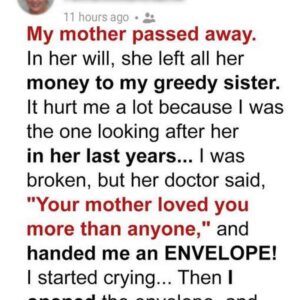When my mom passed, I lost a part of my world—but I didn’t know she’d also left behind a final move that would save me from the rest of it falling apart. My husband Peter had never been her favorite person, and though she never said it out loud, I could always sense the chill behind her polite smiles. Still, I figured that was just the usual tension between a mother-in-law and the man who swept her daughter away.
Now I know better.
Peter changed the moment my mom’s lawyer called. I was still reeling from the grief, barely sleeping, still reaching for my phone to text her, only to remember she was gone. That’s when I got the news: she’d left everything to me—her house, her savings, her retirement accounts. Over $400,000.
Peter’s reaction? At first, he was all compassion. Sweet texts. Breakfast in bed. Warm hands on my shoulder when I broke down. “She wanted you taken care of,” he’d whisper. “You deserve this.”
And then… came the wishlist.
“Let’s get you a new car,” he said one morning. “Maybe a BMW? You’ve always liked those.”
Then came the beach house. “Let’s rent something for the whole summer. Just unwind, reconnect. You can finally breathe.”
Next, a move. “This house isn’t really us, right? We could get something with a pool. A real dream home.”
The more he talked, the more I saw it: this wasn’t about grieving or healing. It was about the money.
So I said no. To the car. The vacation. The move. I told him I wanted time to think. That this money wasn’t his—it was mine, from my mother.
That’s when the love stopped.
No more morning coffee. No more soft words. Just silence, resentment, and a cold shoulder. He moved to the guest room and started floating the word “space” like it was supposed to sound gentle instead of punishing.
Three weeks later, he came into the kitchen, dropped his bombshell, and left it sizzling.
“I think we should separate,” he said, emotionless.
Just like that. No preamble. No softness. Just a man cutting his losses.
“You’ve changed,” he added. “You’re being selfish.”
I stared at him, stunned. “Selfish? My mother died.”
He didn’t blink. “And you won’t even share her money.”
That’s when I knew. Knew my mother had seen this man for who he was, long before I did. Knew she’d sensed something in him I hadn’t been willing to admit.
But I wasn’t going to cry. Not for him.
Instead, I walked to the safe, pulled out the folder I’d almost forgotten in my grief, and slid it across the table.
“Read the highlighted section,” I said.
He frowned, but opened it. His eyes scanned the page—then froze.
“If my daughter is married at the time of my passing, she will not receive access to any inheritance unless and until she is legally divorced. No spouse or third party may claim or access any portion of my estate.”
Peter looked up, face pale. “Wait… if we divorce, you get the money?”
I smiled, quietly. “Every cent. If we stayed together, it would’ve all gone to charity.”
He blinked. Once. Twice. Then said nothing.
My mom—brilliant, protective, intuitive—had set the chessboard long before this moment. She hadn’t just left me money. She’d left me a way out. A mirror to see what I’d been avoiding.
We divorced quietly. No tears. No second chances.
I renovated her house, the one Peter thought was too small, and made it mine. I went to Italy, to Greece, to places I used to only imagine. And every step I took without Peter felt like breathing again.
He’s probably still asking himself how he lost it all.
But the truth? He never really had it. He only thought he did.
And my mother—well, she made sure the only person who walked away with everything was the one she trusted most.
Me.





